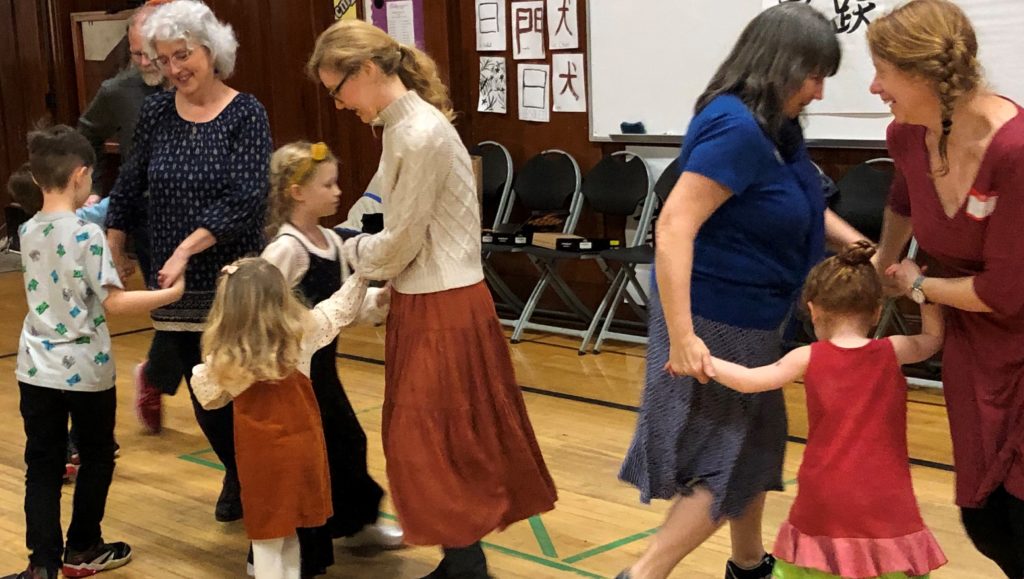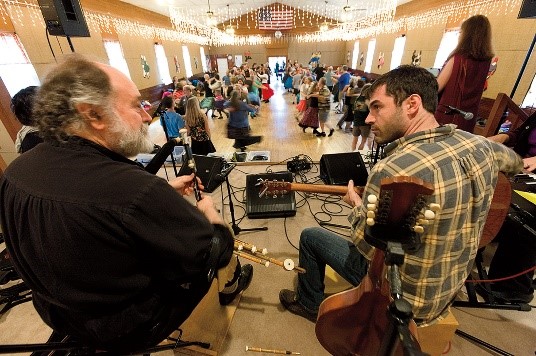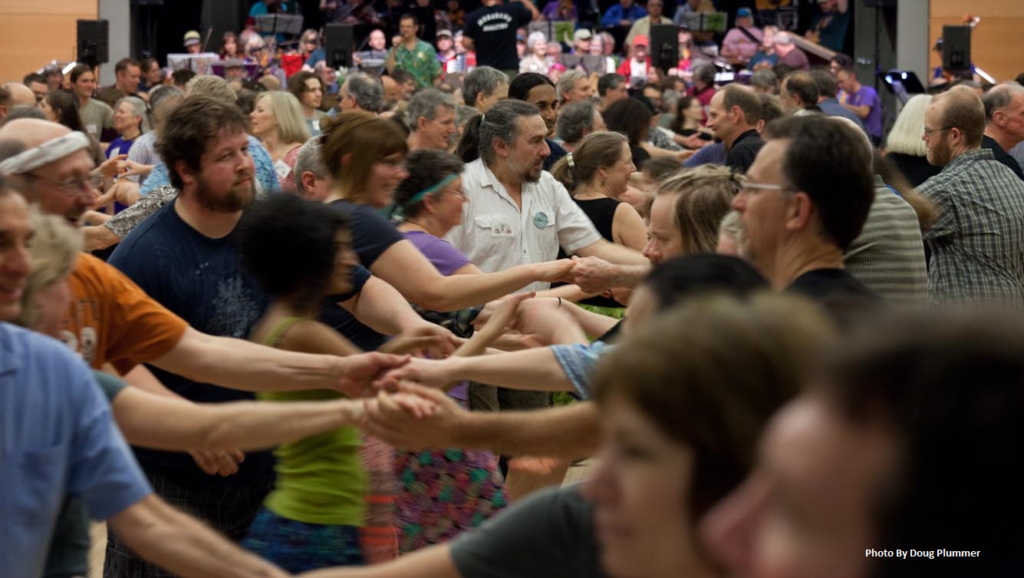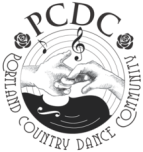Activities
Social interaction, meeting people, and making new friends, set to music.
We dance because it makes us feel good – our bodies are active, our minds are engaged, we feel a connection to other dancers, and the live and lively music.
Come alone or with a partner or bring your family and friends. Just be prepared to leave with a smile on your face when the dance is over. Because, at the heart of it, we dance because it makes us happy.
Portland Country Dance Community keeps traditional dance and music alive by holding regular dances, workshops, camps, and special events. Everyone is welcome.
Contra dancing

Dancers and their partners dance a series of figures, or moves, with each other and with another couple for a short time. They then repeat the same figures with a new couple, and so on. The moves are like those of old-time square dancing but unlike squares, dancers are organized in groups of four in long lines. The figures are combined in different ways so that while each dance is unique, the moves that make up the dance become familiar. The music is upbeat and energetic.
English country dancing

Think about movies like Pride and Prejudice, Sense and Sensibility or Emma and you have indeed seen English country dancing. English Country Dance is not only dances from long ago. The dance is thriving, and new dances and tunes are appearing every day. Music for English dance ranges from hauntingly beautiful tunes to driving reels and jigs.
Family Dance

These are dances designed for participation by the whole family. In addition to dancing, the leader of a family dance might also initiate other activities such as games and singing.
Music

All PCDC dances feature live music.
Contra dance music is often traditional jigs, reels and hornpipes from the Scots-Irish tradition on both sides of the Atlantic. Modern tunes also incorporate music from other traditions, such as Balkan, Scandinavian, and French Canadian. The fiddle is often the lead instrument.
English country dancing is also rich, melodic and varied: tunes used range from popular folksongs, broadsides and ballads of the day, to pieces by Purcell, Grainger, Corelli, Mozart and Handel. Dance tunes include jigs, reels, waltzes and slip jigs. One of the most enchanting aspects of English country dance is the relationship between the music and the dance. Each dance has its own special tune, and the figures of the dance are precisely fit to the phrase of the music.
Wanna try your hand at music?
PCDC hosts FREE slow jams for both Contra and English Country music, open to all acoustic musicians, from beginner to expert, whether you play by dots or by ear.
- Contra Slow Jam – 1st and 3rd Mondays. We play tunes from the Portland Collection and the waltz books edited by Bill Matthiesen.
- ECD Slow Jam – 2nd and 4th Mondays. We play tunes from the Barnes Collection.
Sessions meet 7-9 PM, Community Room at McMenamins Kennedy School, 5736 NE 33rd Ave, Portland, OR 97211.
Would you like to learn to play Contra dance music?
Do you play a melody instrument and want to learn some of those tunes you’ve been dancing to every week? The Second Thursday PCDC Dance Tunes Sessions are for you. The sessions are taught by local musicians who are masters of the contra genre and great teachers. Instruments that show up include fiddle, mandolin, banjo, concertina, cello, guitar and sometimes even a bass playing melody.
Activity Schedule
Regular series
Portland Contra dances – 2nd, 4th, and 5th Saturdays evenings, 7:30p-10:30p (7p lesson for 1st timers)
Fulton Hall (formerly Fulton Park Community center), 68 SW Miles Street, Portland OR 97219
Weekly English Country dances – Friday evenings, 7:30p-10:30p (beginners lesson at 7:15p)
Capitol Hill Dance Hall (a.k.a. Burlingame Water Tower Dance Hall), 8936 SW 17th Ave, Portland OR 97219
Experienced English Country dances – Second Sunday afternoons, 3p-5p
A Renaissance School, 234 S Bancroft St, Portland, OR
Family dances – Second Saturday afternoons during the school year (except December) [on hold until we find volunteers to help run this series]
Fulton Hall (formerly Fulton Park Community Center), 68 SW Miles Street, Portland OR 97219
Tune session music classes – 2nd Thursdays at various locations.
Annual events
Portland Megaband: A special dance held the second Saturday of March – 75 musicians and 500 dancers in the beautiful Oaks Park Dance Pavilion
Portland Raindance: An in-town dance weekend held the fourth weekend of April.
Northwest Passage Dance Camp: A Labor Day dance weekend held at an out-of-town facility where housing and food are supplied
Portland English Country Ball: An Annual “Dress-up” Ball on the first Saturday in November.
New Year’s Dance: Celebrate the New Year with an amazing dance on multiple dance floors in the beautiful Norse Hall (date varies – check the PCDC calendar)
Other Activities
Workshops and Classes: These occur from time to time, including music jams and techniques, calling and composing dances, sound engineering and more. Watch the NEWS section of our home page, the calendar or issues of our newsletter Footnotes.
PCDC Grants Fund – to help PCDC members attend dance and music camps and workshops.
Frequently Asked Questions
What If I Have Never Danced Before?
There are no lessons or classes required to come dance with us. At the beginning of the dance there is a teaching session that will help you to become familiar with terminology and figures. Each dance is taught by the caller (teacher) before it is danced. The caller continues to prompt the dancers as needed. Since the pattern of moves of each dance is repeated often, dances are easy to learn. Both beginning and experienced dancers happily dance together.
What If I Don’t Have a Partner?
No problem! Many people come to the dance alone. Dancers are encouraged to dance with many different partners throughout the evening. In fact, the easiest way to learn is to dance with someone who is more experienced than you!

Do I Need to Wear Special Clothes?
No. Dancers tend to dress informally. Most people dress casually, for ease of movement, and in anticipation of mild to vigorous exercise. Be sure to wear comfortable shoes. (Many dancers prefer smooth, leather-soled shoes that are worn for dancing only to keep the grit of the world off the dance floor.) Please refrain from wearing perfume or using heavily scented personal products.
Do I Have to Join A Club?
Anybody is welcome to attend the dances. If you choose to become a PCDC member your membership dollars help to support the organization, which brings you all these wonderful dances!
